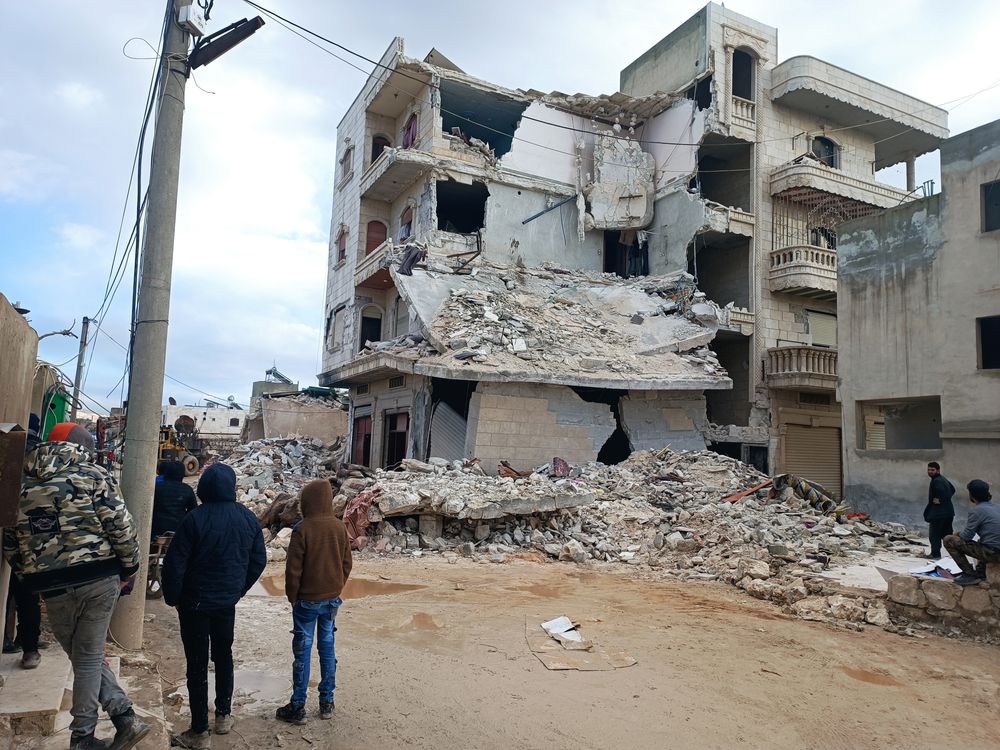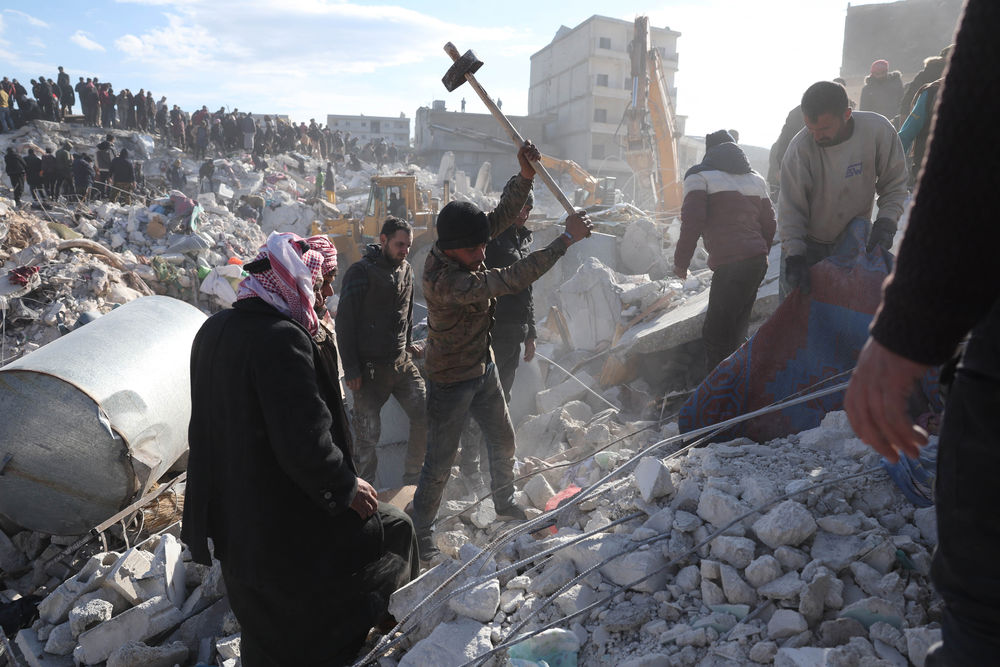1) What is the situation in Northwest Syria?
Following the two strong earthquakes many buildings in northwest Syria collapsed leaving thousands of people homeless. The search for survivors is ongoing, with the hospitals that remain functional treating the wounded. Many hospitals have been damaged, with some, such as the hospital in Jandaris, unable to carry on treating patients. Two MSF-supported maternity centres were evacuated, due to the risk of the buildings collapsing. Our medical staff and the staff of other facilities have been working hard to treat patients since the first earthquake.
There was major destruction in large buildings in urban centres. The locality of South Afrin (Jandaris), Aleppo Governorate, might be the most affected area.
The Displaced Affair Office has opened reception centres and shelters to accommodate the impacted families in Idlib.
According to the latest data available as of 12 Feb, more than 5,800 people have been killed in Türkiye and 1,800 in Syria. More than 20,000 injuries have been reported. And the death toll is expected to rise in both Türkiye and Syria
As of 8 Feb, the MSF-supported health facilities in Aleppo and Idlib governorates received 3,465 injured people and 551 deaths.
The temperatures are very cold, while people remain outside with many sleeping in their cars due to the fear of further aftershocks that have continued until yesterday.
Northwest Syria is already going through a dire humanitarian situation due to many years of war, the economic situation, the pandemic and, more recently, a cholera outbreak. This earthquake makes the situation even more difficult while the medical and healthcare system continues to be fragile.
2) What are the main needs we’re seeing?
In the aftermath of the earthquake, the needs are both medical support and relief assistance to the population. Accordingly, we have been treating injured people in northwest Syria and supporting health facilities.
Offering immediate relief support to people affected by the earthquakes, particularly those without shelter in this cold weather, will be a main priority. People need shelter, food, blankets, clothes, heating materials, hygiene kits, and medical assistance.
We are witnessing a lack of fuel, electricity and adequate water and sanitation. There is also a major challenge for people impacted by the earthquake to access mental health support, including our staff.
The region of northwest Syria has witnessed many years of ongoing humanitarian crises, with this earthquake causing yet more problems for the population. We will continue to assess the needs and adapt our response accordingly.
3) What is MSF doing?
SYRIA: Since the first hours following the first earthquake, our Syrian colleagues have been working to provide help and care, even though their own personal situations were difficult. MSF has received wounded patients in the hospitals we run and support. We’ve treated more than 200 patients in the first hours. In addition, we started a mobile clinic in Kelly’s reception center, in Idlib governorate, and we’re also offering support to ambulances to facilitate the transfer of patients in need of emergency assistance.
MSF has activated an immediate response based on its emergency preparedness plan, supporting hospitals in Idlib and Aleppo with emergency kits, trauma kits, surgical kits. We have supported hospitals with senior staff from our teams. We have also scaled up the bed capacities in our medical facilities by adding tents where needed, and dressing points.
As an initial response, we’re distributing blankets, hygiene kits and food items to target 2,500 families in Jindiris area, Afrin District of the Aleppo Governorate.
We also worked on increasing the capacity of the medical system by providing emergency medical items and kits to over 23 hospitals and clinics in northern Idlib. And we’re initiating psychological first aid activities in the facilities we’re supporting and across the mobile clinics.
Besides the emergency response, MSF continues to provide its regular medical assistance and activities in hospitals that have not been affected, in order to support the population and ensure continuity of care for the most vulnerable, such as pregnant women, people with chronic diseases etc...
In northwest Syria, MSF is also working in partnership with two local NGOs.
4) What is the situation in southern Türkiye /what are the main needs?
At least 150,000 people in Türkiye have been left homeless by the earthquake and its aftershocks, which caused about 6,000 buildings to collapse, according to the International Federation of the Red Cross.
The authorities are requisitioning schools for future shelters and their mobile teams are deployed so that people can donate blood. They have declared alarm level 4 and a three-month state of emergency in the 10 hardest-hit provinces.
The authorities have said that the immediate needs identified are for shelters, NFI distribution activities and food distribution. We do not have much visibility on medical needs yet.
MSF emergency teams are assessing the needs in the most affected areas of southern Türkiye. Hatay, Gaziantep and Diyarbakir seem to be very affected by the earthquake. The city of Hatay is now closed because of buildings still collapsing. The assistance will be provided in the outskirts of the city.
5) What needs to be done?
SYRIA: The needs will be massive for a population who have huge needs, both for medical care and non-food items (blankets, heating materials).
There will be even more displaced people in a region where 2.8 million people, out of a population of 4 million people, were already displaced.
This earthquake adds a dramatic layer for the vulnerable people here who are still struggling after many years of war. The massive consequences of this disaster will require an equally massive international aid effort. International aid must reach northwest Syria as soon as possible to support the population.
We remain in close contact with the local health authorities in northwest Syria to extend our support where it’s needed.
TÜRKIYE: first, support must be provided to the population gathered in shelters. Then medical aid will be needed.
6) Are the staff impacted in NWS?
We received the tragic news of the death of two of our colleagues who were found under the rubble. Many of our staff, who are living in northwest Syria, have been impacted, whether directly or indirectly, by the earthquakes. Some have lost their houses or their loved ones too.
To ensure they have the support they need, we are in close touch with our colleagues inside northwest Syria, providing them with the psychological support and other support we can offer.
7) What are the next steps for the MSF response?
MSF teams and partners are currently assessing the situation and needs in Idlib and northern Aleppo in Syria and in southern Türkiye to scale up our response accordingly, as the number of deaths and injuries increase. We are working in close contact with the local authorities in northwest Syria and with the authorities in Türkiye to extend our support where it’s needed.
MSF is already preparing additional help to be sent to northwest Syria.
MSF is ready to provide assistance in Türkiye, and to mobilize its emergency capacities, as we were not working inside Türkiye before the earthquake. Discussions are going on with the authorities and local partners regarding the frame of our support.
8) How is humanitarian aid coming inside northwest Syria?
Bab Al-Hawa remains the only humanitarian crossing between Turkey and northwest Syria, from which essential life-saving medical supplies can enter northwest Syria. However, it’s not as functional as it should be and the roads leading to the border have been damaged. We are supporting the call to make sure that Bab Al Hawa remains open, and more access points are available for humanitarian help to enter northwest Syria.
The biggest challenge would be a potential delay in the importation of humanitarian and medical aid into Syria, since almost all organizations and actors rely on this crossing for their activities.
9) What are the challenges you’re facing while responding to the current emergency?
We are expecting a lot of pressure on local supply markets. In consequence, we are expecting the prices to rise and shortages to happen. Fuel might become an issue as well.
We are also expecting some challenges to bring big volume of humanitarian aid inside Syria, as the access points remain limited and there is a risk of a bottleneck impeding the flow.
We have also used our emergency stocks to respond in recent days, and we will need to replace them as soon as possible.
MSF has been present in northwest and northeast Syria for many years, making a swift response possible in the most affected areas, mainly in NWS, while NES was much less affected.
Earthquake response in Northwest Syria:
MSF supported 30 hospitals and health facilities through donations of various medical and relief kits. This includes facilities in Azaz, Afrin, Mare’a, Bab Al Hawa, among other towns. We also sent medical staff, including surgeons, to support hospitals dealing with the influx of wounded.
In 4 health facilities (hospitals and clinics) in Idlib governorate, we’re treating injured patients, and we increased the capacity of the hospitals we’re working in by adding triage tents in the outside wards.
In addition, we deployed our ambulances and we’re supporting 90 ambulances to facilitate the transfer of patients in need of emergency assistance to the closest health facilities.
We set up mobile clinics in three reception centers that were deployed in Idlib city and surroundings, to offer essential medical services to people affected by the earthquakes.
As an initial response, in Aleppo governorate, with our local partners, we distributed food and blankets to more than 500 families in the reception centers in Afrin.
Similarly, we distributed more than 450 kits, including hygiene items, kitchen kits, winter kits and blankets, to affected people in Jandaris, one of the most affected cities, and families in reception centers in Azaz and Mare’a and surrounding villages.
In the west of Idlib city, we distributed 2,500 blankets, plastic sheeting, and 100 winter kits to families.
Offering immediate relief support to people affected by the earthquakes, particularly those without shelter in this cold weather, will remain a priority for our team. We will continue to assess the needs and adapt our response accordingly.



